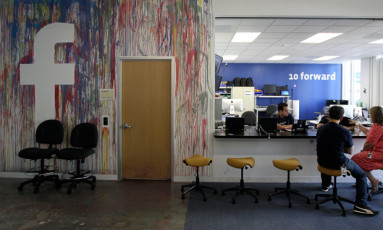Following the leader, is a pinch of salt quite enough?

When it comes to business practices and innovation – the loudest opinions, not surprisingly, come from business innovators and successful entrepreneurs. The ability to think ‘outside the square’ is generally the thing that has made them successful. When they publicize their ideas, the business community are quick to promote them automatically as the new paradigm – what’s ‘outside the square’ for the innovators becomes the new norm for everybody else.
Views on how we should employ each other is one of the very hottest topics. Google, Apple, Facebook are all setting the new industry ‘norms’ for employment. For Steve Jobs it was about how you hire, for Mark Zuckerburg it’s about how you inspire, for Microsoft it’s hot-desking, for Google it’s about company culture – driven by ‘nap pods’, ‘free food’, rental cars and on-site day-care. Richard Branson, although frankly lacking in quite the same level of ‘silicon valley cool’, has also been continually vocal on how the workplace should be, advocating unlimited annual leave, and zero restriction on working from home.
In theory, it’s great to look at these industry giants for innovative practice, but in my opinion a little bit of realism is needed before applying these practices into standard workplaces with an expectation that they will be effective. The simple fact is that what these companies have in common is that they are hugely popular to work for: Facebook and Google each report having over 250,000 job applicants per year. Forgive me for cynicism, but when you hand-pick your workforce from a pool of a quarter of a million of the world’s most talented and ambitious, is there really much of a challenge keeping these people productive and happy? These companies could probably introduce the ‘upside down, electricity free office with hologramatic furniture’ and still get the results they require. These trendy management innovations fail to acknowledge that in the industries most of us operate within (let’s call it “the real world”), a lot of the workforce would rather not come to work if they didn’t have to, and almost all of us would be a little happier doing slightly less each day than is currently expected of us while we are here. There’s nothing shameful in admitting this, it is after all why we get paid. Managing these staff scenarios is the real paradigm, and most of the time the solutions are very firmly ‘inside the square’.
In fact the office layout innovations have already been thoroughly discredited now in terms of productivity and staff happiness. The Washington Post had this to say about the open plan, while the Sydney Morning Herald had this on ‘hot desking.’ It doesn’t take a Steve Jobs or Mark Zuckerberg sized intellect to see that the saving in real estate cost is the real driving force behind these measures. But it also comes down to the nature of the work done. Not every workplace is seeking large amounts of innovation or extroverted collaboration. In my firm, I am not really looking for my legal staff to ‘innovate’, shout their ideas across the office, or graffiti the walls with inspirational statements. I would prefer them to ‘concentrate’ on the tasks they are assigned, which is not best achieved cramped onto a shared worktop while someone plays ping-pong 50cm from their head. There’s also the very real danger that far from encouraging collaboration and equality, these systems result in the type of school-yard ‘survival of the fittest’ which is a breeding ground for a variety of workplace problems. This Chloe Taylor article gives a great example of what can go wrong.
But with the more trivial benefits, ask any hospitality operator how an unlimited ‘free food’ policy would work for them, or retail operator whether they would consider installing a ‘nap pod’ for the use of sales assistants in each of their stores. In the “real world”, where the benefits and remuneration available to employees is generally far below their expectations or desires, these types of luxuries are ridiculous. It’s almost insulting to talk about them seriously.
 But Branson’s concepts are a little more disingenuous. In talking about his ‘smart’ and ‘simple’ solution, he’s never gone on record to explain why his annual leave scheme only applies to his ‘personal staff’ – (his executive team of 170). I’m fairly certain that Sir Richard is aware that if he gave his Virgin Airlines Baggage handlers (for example) unlimited annual leave without keeping track of it, or invited them to work from home any time they liked, there would be significant impacts on productivity. In fact he knows that it’s only among the highly competitive and ambitious of his team that a self-managed annual leave scheme will keep annual leave at acceptable levels, it may even reduce. In competitive executive circles, there has always been a ‘badge of honour’ in refusing to take personal leave. By analogy, there is very real chance that this could happen with annual leave under Branson’s model. Currently executives normally struggle to use the leave they are entitled to. Many exit jobs after a decade and are paid out accruals of up to 400-500 hours. How is Branson intending to calculate these payments on termination? That’s right, nobody keeps track anymore. How convenient?
But Branson’s concepts are a little more disingenuous. In talking about his ‘smart’ and ‘simple’ solution, he’s never gone on record to explain why his annual leave scheme only applies to his ‘personal staff’ – (his executive team of 170). I’m fairly certain that Sir Richard is aware that if he gave his Virgin Airlines Baggage handlers (for example) unlimited annual leave without keeping track of it, or invited them to work from home any time they liked, there would be significant impacts on productivity. In fact he knows that it’s only among the highly competitive and ambitious of his team that a self-managed annual leave scheme will keep annual leave at acceptable levels, it may even reduce. In competitive executive circles, there has always been a ‘badge of honour’ in refusing to take personal leave. By analogy, there is very real chance that this could happen with annual leave under Branson’s model. Currently executives normally struggle to use the leave they are entitled to. Many exit jobs after a decade and are paid out accruals of up to 400-500 hours. How is Branson intending to calculate these payments on termination? That’s right, nobody keeps track anymore. How convenient?
Looking to the innovators for ideas in the abstract is always a great idea. But a hefty pinch of salt is needed before putting it into practice at work.
This content is general in nature and provides a summary of the issues covered. It is not intended to be, nor should it be relied upon, as legal or professional advice for specific employment situations.



Well put. I find this in so many discussions about employment and of course the famous ‘work-life balance’. They always seem to be talking about it from the point of view of someone whose particular skills etc make them a particularly marketable commodity. Which is a tiny proportion of the workforce